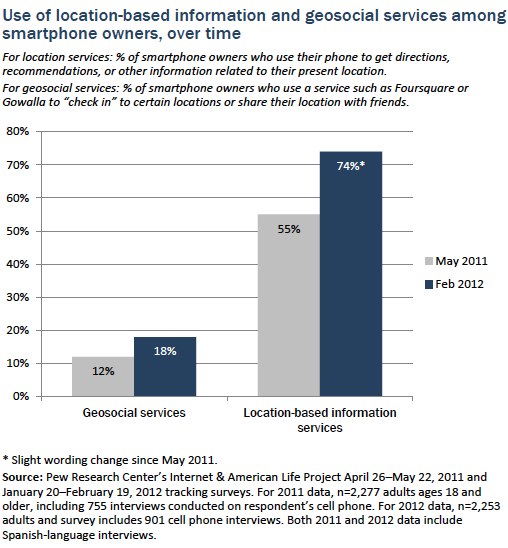 As mobile access and tablet ownership becomes increasingly prevalent, it likely comes as no surprise that smartphone ownership is on the rise, too. Recent data from Pew Internet also shows that more smartphone owners are accessing real-time, location-based information like directions and recommendations on their phones. No surprise to me–heck, I use location-based information and recommendations pretty much constantly. What about you?
As mobile access and tablet ownership becomes increasingly prevalent, it likely comes as no surprise that smartphone ownership is on the rise, too. Recent data from Pew Internet also shows that more smartphone owners are accessing real-time, location-based information like directions and recommendations on their phones. No surprise to me–heck, I use location-based information and recommendations pretty much constantly. What about you?
Mobile is Information on Steroids
What may be surprising is how fast this number has increased. Consider that in May 2011, 55 percent of smartphone owners used their mobile devices to access real-time location-based information. As of February 2012, that number shot up to 74 percent. Not only are more smartphone owners on the search for location-based info—they’re also increasingly likely to use geosocial services like Foursquare to check in and share their location.
It’s no secret that smartphone users love to receive real-time information about the goings-on in their cities and share their location with friends. And although this trend is growing among all smartphone users, teenagers are especially likely to use geosocial sites like Foursquare and Yelp. Not shocking, right? It makes sense to us, given that some adults are more skeptical about sharing their real-time whereabouts online. But this is important—teenagers are your customers of tomorrow, and we all know that tomorrow is but a heartbeat away.
How Mobile Trends Impact Your Brand
Examining technology use is, for us, something that never gets old—after all, we love data. What’s important is to read between the lines and analyze how these stats will impact your company or brand. If you’re a restaurant owner, for example, how’s your mobile marketing strategy? If customers (and prospective customers) are searching for real-time directions, hours and reviews from their smartphones, will they find what they’re looking for? The key is to get in your customer’s brain and understand what sort of information they might need. And also understand when they might need it. For instance, chances are good they’re not sitting in front of their desktop looking for information on your restaurant. So do you either have a mobile version of your website or is your existing site optimized for mobile? If not, you could be irritating customers and chasing them away—before they ever visit your place of business.
The Time for a Mobile Strategy is Now
We say it all the time, but it bears repeating: mobile is where it’s at. A mobile strategy should be at the very top of your list of “things to pay attention to” – now, not later. If the number of smartphone users went from 55 to 74 percent in less than a year, well, you can only imagine how those figures will change by this time next year. And although it’s critical for any business to have a mobile strategy, it’s especially important for local businesses to stake their claim on the Web and make sure that their customers can find the information they need, when they need it. Consider it an extension of your company’s customer service—and if customers hit a wall when they’re searching for the answer to a real-time question, that’s not the sort of impression you want your business to make.
Have you incorporated location-based information into your mobile marketing strategy? If not, do it today.
Image by William Hook via Creative Commons
The post More Smartphone Owners Opt For Location-Based Services appeared first on V3B: Marketing and Social Media Agency.

















